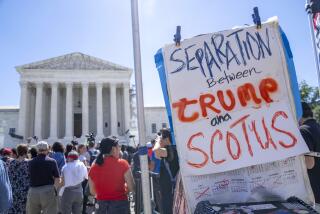The law of the land
- Share via
An oral argument in the U.S. Supreme Court last week featured an especially dramatic example of role reversal. The administration of George W. Bush, a former governor of Texas and an enthusiastic supporter of capital punishment, asked the justices to force the courts of his home state to grant a new hearing to a death row inmate.
That wasn’t the only oddity. The administration asked the Supreme Court to order a new hearing for Jose Medellin, a convicted rapist and murderer from Mexico, because Bush -- not usually known for his deference to international organizations -- promised Mexico he would secure one after Medellin and 50 other Mexicans on American death rows (including 28 in California) won a victory in the International Court of Justice in The Hague.
The World Court found that the inmates had not been allowed to confer after their arrests with consular officials from their home country, a right guaranteed in the Vienna Convention on Consular Relations, which the United States ratified in 1969. In 2005, the international tribunal said the inmates deserved “a review and reconsideration of the convictions and sentences.” Bush agreed.
But the Texas courts wouldn’t go along. In the Supreme Court last week, the state’s solicitor general rightly called Bush’s attempt to obtain a new hearing order “a very curious assertion of presidential power.” In what was obviously music to the ears of most of the justices, he added: “The Supreme Court has the final authority to determine what federal law is.”
Indeed it does. In the 1803 case of Marbury vs. Madison, Chief Justice John Marshall famously wrote that “it is emphatically the province and duty of the judicial department to say what the law is.” That is still true today. Now that the Texas courts have balked at taking orders from the president, the Supreme Court should regain control of the case. As the ultimate arbiter of the meaning of the “law of the land” -- including treaties -- the justices can and should rule that the violation of Medellin’s rights under the Vienna Convention entitles him to a new hearing in Texas.
More to Read
Sign up for Essential California
The most important California stories and recommendations in your inbox every morning.
You may occasionally receive promotional content from the Los Angeles Times.










